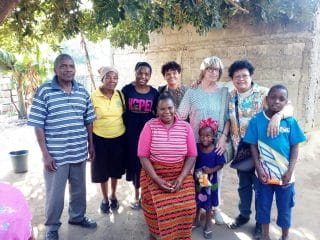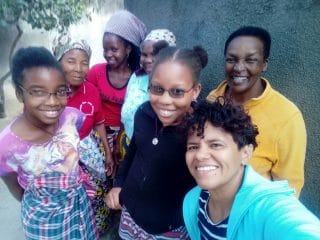 “Focolares that rove throughout the world,” is how Chiara Lubich described them – made up of young people, adults, families, religious or teens. It’s a project that is being repeated, after positive results and the fruits from this original way of meeting and exchange, which temporary focolares bring to various parts of the world. One of these was at Maputo, the capital and largest city of Mozambique, as well as the main port there in Delagoa Bay, which is on the Indian Ocean. This city in southern Africa is full of crowded and colorful markets, many of which are most alive in the evenings, and features a train station designed by Gustave Eiffel. From August 1–30, a temporary focolare was established there, made up of Antonietta, Giovanni and Perga (from Loppiano), Father Rogelio (a religious priest from Maputo), Father Stefan (from Switzerland) and Fatima (from the Johannesburg focolare). “When we got to Maputo, we immediately made a pact of unity between us. In the days that followed, in various meetings with people from there – young people, families at home, their workmates and friends, and men and women religious – we saw the light of Chiara Lubich’s charism enter their hearts, and they were fascinated by the Gospel becoming life.” There were also other beautiful family moments, such as those with Archbishop Francisco Chimoio, who told us to ‘not lose that joy and bring it to the world,’ and with Papal Nuncio Edgar Pena, who emphasized the importance of “sowing the seeds.’”
“Focolares that rove throughout the world,” is how Chiara Lubich described them – made up of young people, adults, families, religious or teens. It’s a project that is being repeated, after positive results and the fruits from this original way of meeting and exchange, which temporary focolares bring to various parts of the world. One of these was at Maputo, the capital and largest city of Mozambique, as well as the main port there in Delagoa Bay, which is on the Indian Ocean. This city in southern Africa is full of crowded and colorful markets, many of which are most alive in the evenings, and features a train station designed by Gustave Eiffel. From August 1–30, a temporary focolare was established there, made up of Antonietta, Giovanni and Perga (from Loppiano), Father Rogelio (a religious priest from Maputo), Father Stefan (from Switzerland) and Fatima (from the Johannesburg focolare). “When we got to Maputo, we immediately made a pact of unity between us. In the days that followed, in various meetings with people from there – young people, families at home, their workmates and friends, and men and women religious – we saw the light of Chiara Lubich’s charism enter their hearts, and they were fascinated by the Gospel becoming life.” There were also other beautiful family moments, such as those with Archbishop Francisco Chimoio, who told us to ‘not lose that joy and bring it to the world,’ and with Papal Nuncio Edgar Pena, who emphasized the importance of “sowing the seeds.’”  Three focolarine had a “tour” of Zimbabwe, although not as tourists. “It was an experience that I would recommend to many,” writes Cielito from Portugal, “since it opens your heart, mind and soul to the needs of humanity. The two weeks seemed like months, such was the intensity of each day.” After this they had a brief stop in Johannesburg, “which was our first approach to this continent’s poverty, although it would be quite different to what we would find afterwards.” Then the small group moved to Bulawayo, hosted by a friend in a suburban neighborhood, who shared so much despite her lifestyle of poverty. “Zimbabwe,” Cielito explains, “is a country that is mostly Christian, and people’s lives revolve around the parish, with a strong sense of belonging. Our friends from the Focolare had prepared for us a ‘tour’ of the city’s various parishes. We met more than a thousand people during those few days, many of which were children and young people. We presented ourselves and told of our experiences based on the Gospel. “Each morning we set out, entrusting ourselves to Mary, not knowing who we would meet. We put as many useful things as we could into our backpacks and away we went, trusting only in the Holy Spirit. Leaving God to direct our day, we were amazed at what he would do. “We found so much generosity, readiness and commitment, despite having only the poorest of means, and this for us was a great witness. “For the second week, we moved inland to a mission (a college the Jesuits founded 130 years ago), and from there we went for two days to a rural village that was quite far out, to visit a group of people who have been living the Word of Life for years. They are very poor, yet they were able to welcome us in an exquisite way. Their generosity, simple and profound faith, and the purity of their hearts won us over. In such a faraway place, in the middle of nowhere, we saw with our own eyes how truly universal the charism of unity is.”
Three focolarine had a “tour” of Zimbabwe, although not as tourists. “It was an experience that I would recommend to many,” writes Cielito from Portugal, “since it opens your heart, mind and soul to the needs of humanity. The two weeks seemed like months, such was the intensity of each day.” After this they had a brief stop in Johannesburg, “which was our first approach to this continent’s poverty, although it would be quite different to what we would find afterwards.” Then the small group moved to Bulawayo, hosted by a friend in a suburban neighborhood, who shared so much despite her lifestyle of poverty. “Zimbabwe,” Cielito explains, “is a country that is mostly Christian, and people’s lives revolve around the parish, with a strong sense of belonging. Our friends from the Focolare had prepared for us a ‘tour’ of the city’s various parishes. We met more than a thousand people during those few days, many of which were children and young people. We presented ourselves and told of our experiences based on the Gospel. “Each morning we set out, entrusting ourselves to Mary, not knowing who we would meet. We put as many useful things as we could into our backpacks and away we went, trusting only in the Holy Spirit. Leaving God to direct our day, we were amazed at what he would do. “We found so much generosity, readiness and commitment, despite having only the poorest of means, and this for us was a great witness. “For the second week, we moved inland to a mission (a college the Jesuits founded 130 years ago), and from there we went for two days to a rural village that was quite far out, to visit a group of people who have been living the Word of Life for years. They are very poor, yet they were able to welcome us in an exquisite way. Their generosity, simple and profound faith, and the purity of their hearts won us over. In such a faraway place, in the middle of nowhere, we saw with our own eyes how truly universal the charism of unity is.”
Put love into practice
Put love into practice




0 Comments